
Makerere University College of Humanities and Social Sciences (CHUSS) with support from the Mellon Foundation is framing a book on pedagogies to guide humanities scholars conduct Archival research in the Global South. The book will be two special issues of the Journal of Mawazo and the Journal of Languages, Literature and Communication.
The college has also created a community (in terms of reading groups, symposium and colloquium) and inaugurated discussions and debates around archiving in its various forms.
In addition, an international conference is being planned for November 2024 as a gift to humanities research in Archiving, Memory and Method from the Global South.
The College received a grant from the Andrew W. Mellon Foundation of New York to support research in Archiving, Memory and Method from the Global South.
The primary aim of the research project was to build capacity for Makerere faculty and students to engage in archival research and theoretical debates that reconfigure the archives as sites of power, memory and social struggle.
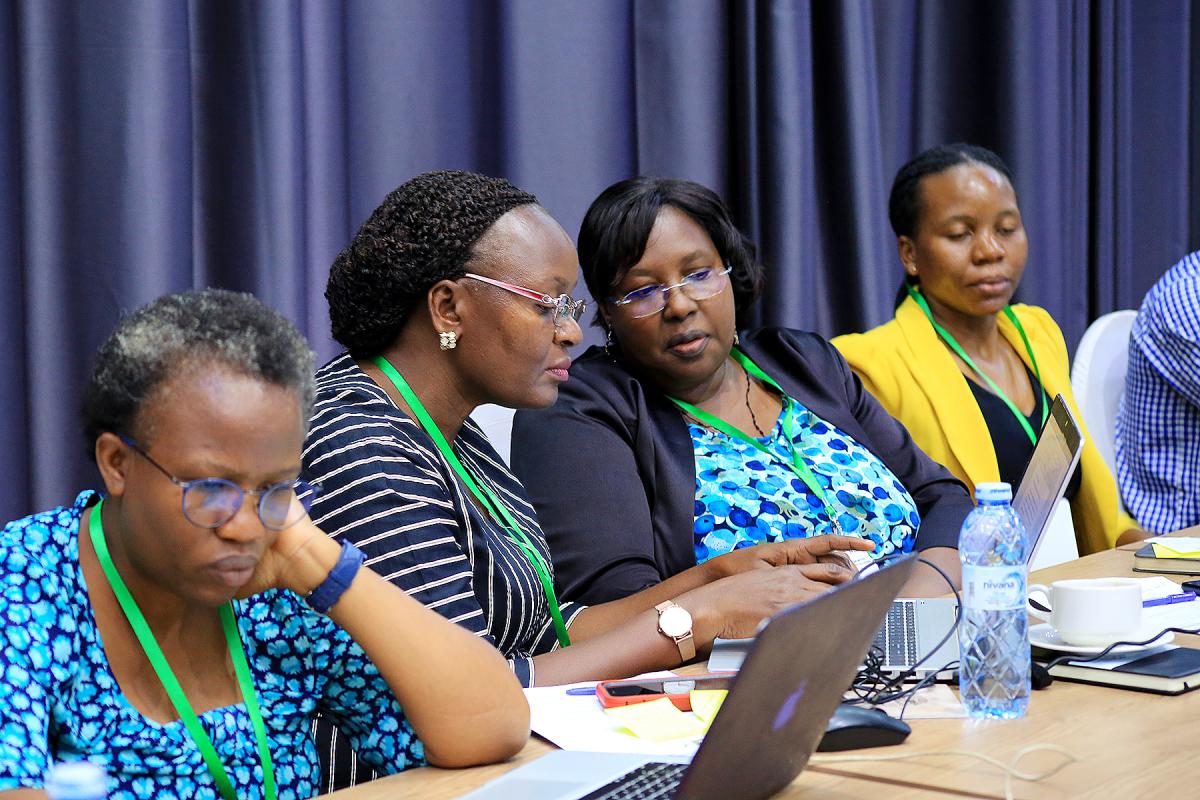
Thus, the funding has congregated Makerere University scholars and students to collaborate with archival institutions and communities to ethically shape future trends and debates in archival preservation in Uganda, including in the repatriation and decolonisation of colonial-era archives.
This project’s research trajectory, public engagements and outputs will significantly contribute to Makerere University’s strategic direction of becoming research led university.
Over the last 24 months, the 15 scholars, 3 post-doctoral researchers and 8 graduate students have, through quarterly reading groups, symposium and archival fieldwork, not only contributed to and increased academic vibrancy in the College in terms of archival research, but they have also generated substantial data that can inform the future methodological and theoretical direction of archiving scholarship in the region.
By this cohort of Makerere University based archival scholars approaching fieldwork, archival documents, oral histories, linguistic data, archaeological artifacts, they have unearthed a productive intersection between archival research, fieldwork, and the archiving of knowledge in contested domains of public life.
The 8-9th February 2024 colloquium Convened
Cognizant of the complexity of archival data, especially in the shadows of histories that often evoke violence, trauma, and discordant memories, Makerere University’s Archiving, Memory and Method from the Global South Research Project hosted a two-day colloquium to reflect upon archival theory and data collection methodologies.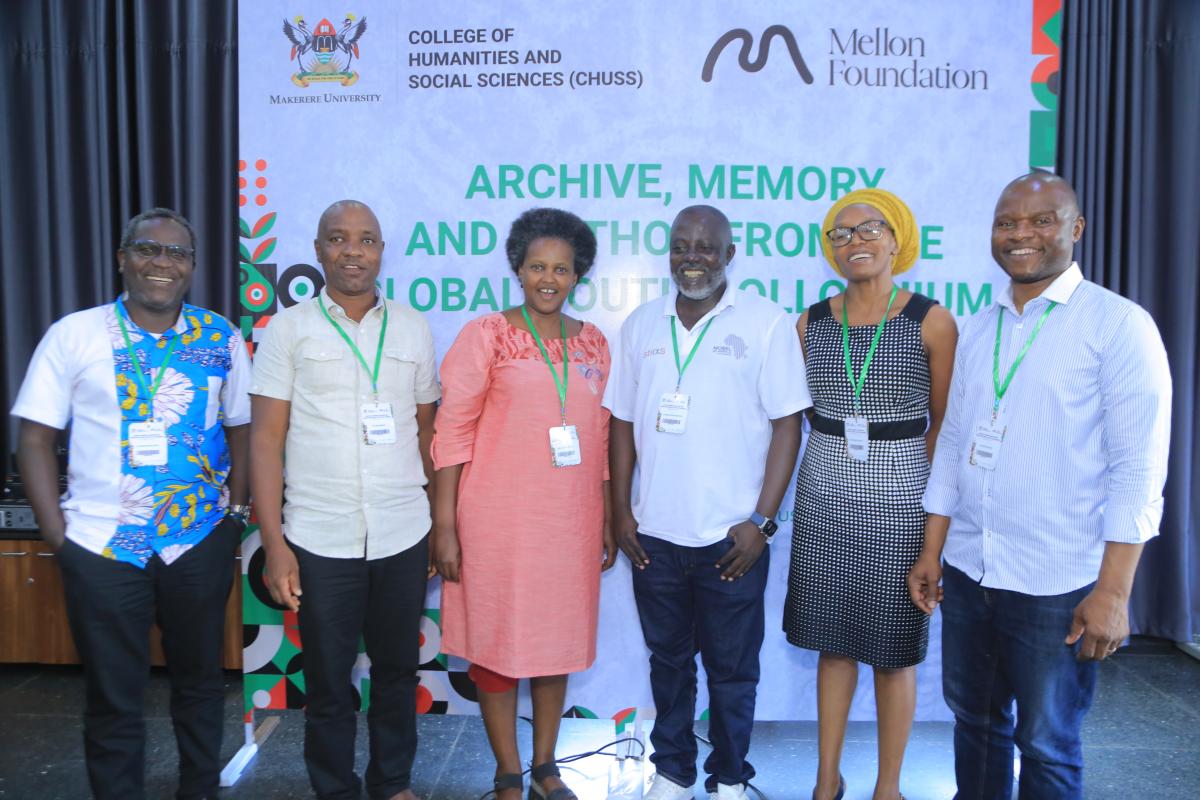
The colloquium held on 8-9 February, 2024 at Fairway Hotel in Kampala, brought together Authors, Senior Scholars, Fellows and Graduate students on the project who presented their work in progress for review. The scholarly works focus on the project’s three thematic clusters of: Archives and Communities: Memory, Representation, Time; Archives and Institutions: Power, Justice, Labor and Archives and Academia: Knowledge from the Global South.
The colloquium also congregated two keynote addresses and panel discussions by renown international scholars of archival research from the global south including Dr. Edwina Dei Ashie-Nikoi from the University of Ghana at Legon, Prof. Grace Musila (University of the Witwatersrand), Prof. Lynda Spencer ( Rhodes University), Dr. James Taabu Busimba (Uganda Christian University), Dr. Godwin Siundu (University of Nairobi) and Dr. John Wakota (University of Dar es Salam).
A panel discussion on the practice of community archiving and museum curation was graced by three curators namely; Mr. Francis Wanyina from Mt.Elgon Cultural Centre in Mbale, Mr. Moses Kashure form Igongo Cultural Museum in Mbarara and Mr. Fred Bwanika from Buddu Cultural Centre in Masaka. The trio shared their experiences and insights of upcountry community museums.
Opening Remarks
While officially opening the colloquium, the Vice Chancellor Makerere University represented by the Academic Registrar Prof. Mukadasi Buyinza underscored the importance of Archival research in the university.
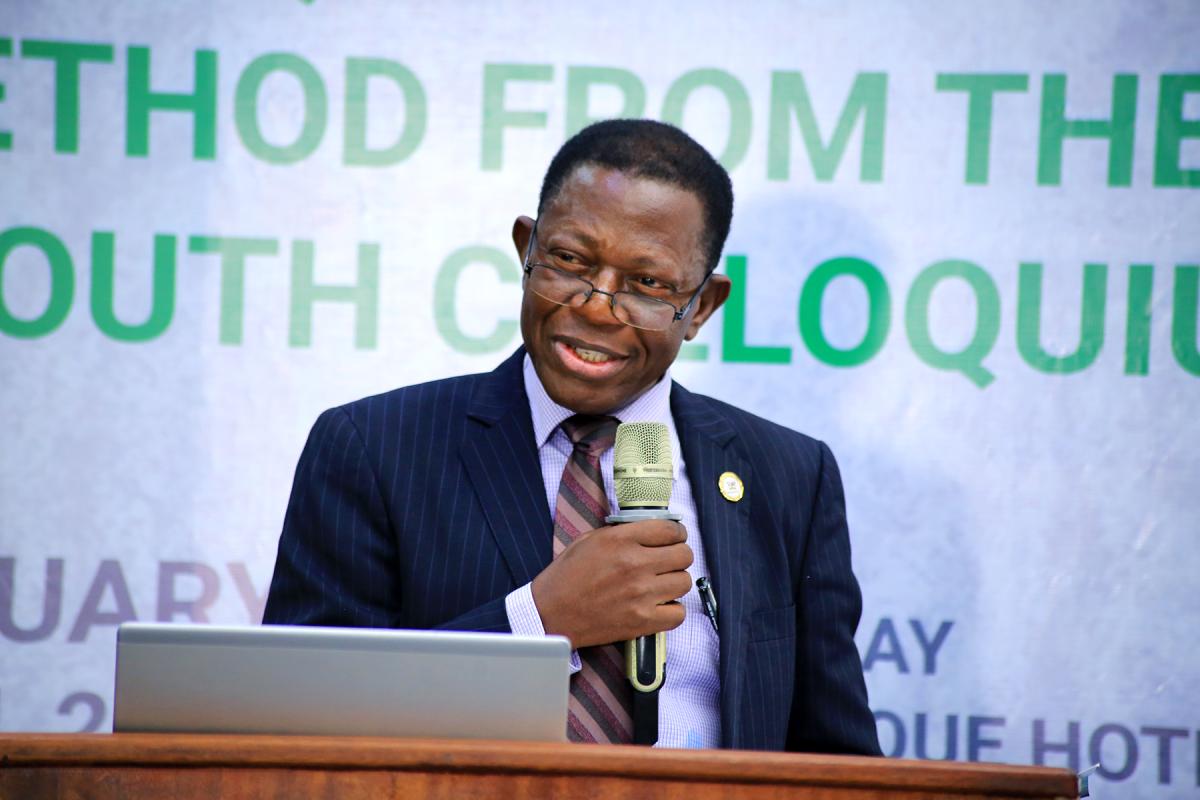
He said the university has taken keen interest in archival research on grounds that archives are repositories of memory providing reliable evidence to examining the past.
“At Makerere, we strongly believe that research in archives is the new issue of doctoral education and scholarship in general. We need to take a new look at the current status and adapting academic archives as the main repository of historical contentment and institutional legacy. There is no way you can talk about institutional legacy without talking about archives and preserving records,” The professor said
The Vice Chancellor commended the project for delivering on its objectives.
“The project has been productive in enabling us to engage in archival research and conceptual debates that help us to put in context issues of power, memory and social change and struggles”, Buyinza added.
Referring to the three thematic areas, Prof. Buyinza said, this was the optune time to reflect on the role of archives. He challenged the participants to determine how humanities scholars can be best positioned to assist and benefit from the growing archival infrastructures in Uganda and across the Global South. This he said, is especially more pressing when it comes to the intangible archives that reside within communities adding that this scholarship and community outreach can add great value to our visibility as a research-led institution as well.
The Professor appreciated the Mellon Foundation for considering the researchers’ proposal worth funding and allocating resources that have empowered staff and students to contribute to the university’s research-led aspirations in as far as archival research is concerned.
The funding he added, has encouraged Makerere University scholars and students to step out of the confines of our campus walls and collaborate with archival institutions and communities in the region and across the continent.
The project Principal Investigator, who is also the Principal CHUSS Prof. Josephine Ahikiire said the day was to engage and learn from each other. She said the discussion centered around things that had been taken to the back water of scholarship as they all run with imperatives of the world bank.
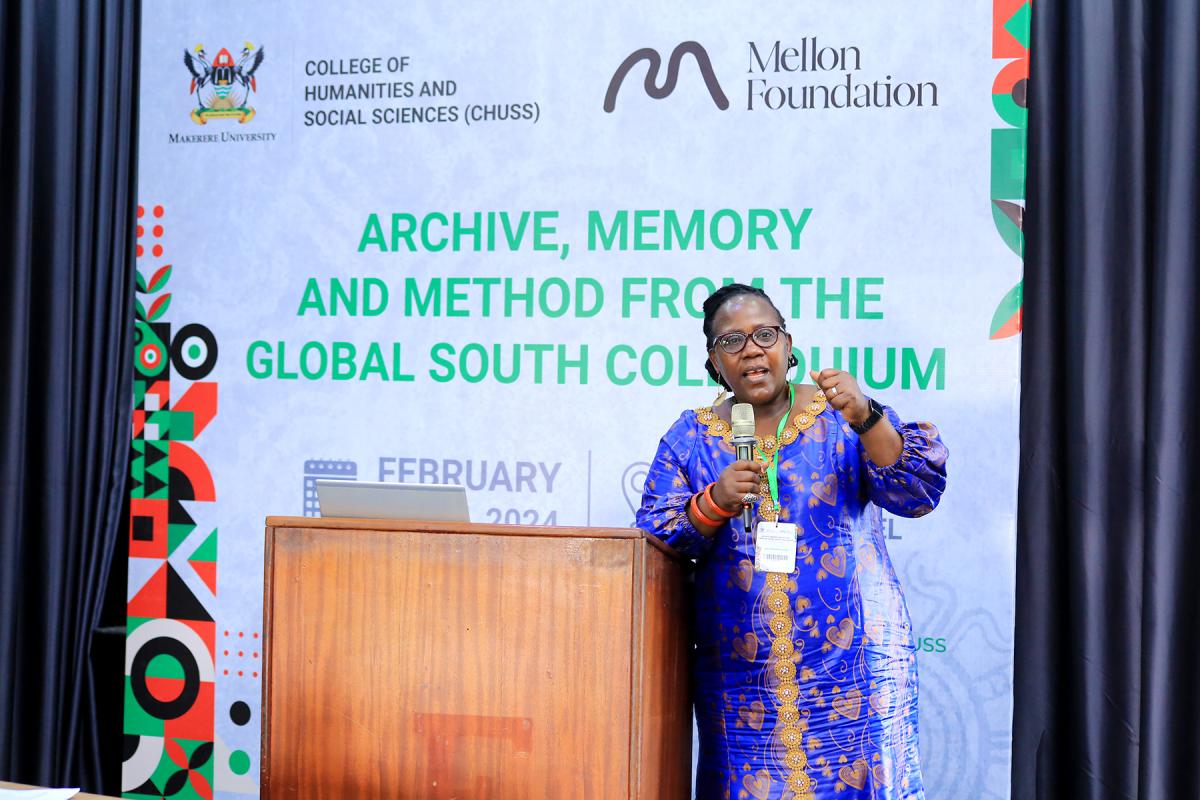
“Some of these imperatives help us to regain our humanity on the sideline and it is us to redeem them and make ourselves as relevant to regenerate our language, cultures and histories.
I would like to thank everyone who has invested energy into archives despite the fact that we are in presentism, solving problems of poverty, rising population where thses kind of debates look like a luxury. This is the real humanities that will take us to the next level.
This is why, we are also investing in the students in history, gender studies philosophy, literature and linguistics to ensure that they are also introduced to some of these methodological questions and be able to pursue meaningful and critical scholarship on our continent,” Prof. Ahikire noted.
The project objectives and deliverables
The Colloquium convenor from Makerere University College of Humanities and Social Sciences Dr. Edgar Nabutanyi said, the goal of this colloquium was to determine how humanities scholars can be best positioned to assist and benefit from the growing archival infrastructures in Uganda and across the Global South.
Nabutanyi explained that the project, “Archiving, Memory and Method from the Global South,” is an intellectual intervention based on the understanding that although archives are important, humanities scholarship especially in Uganda have not been keen to investigate the relationship between archives, public life and public discourse.
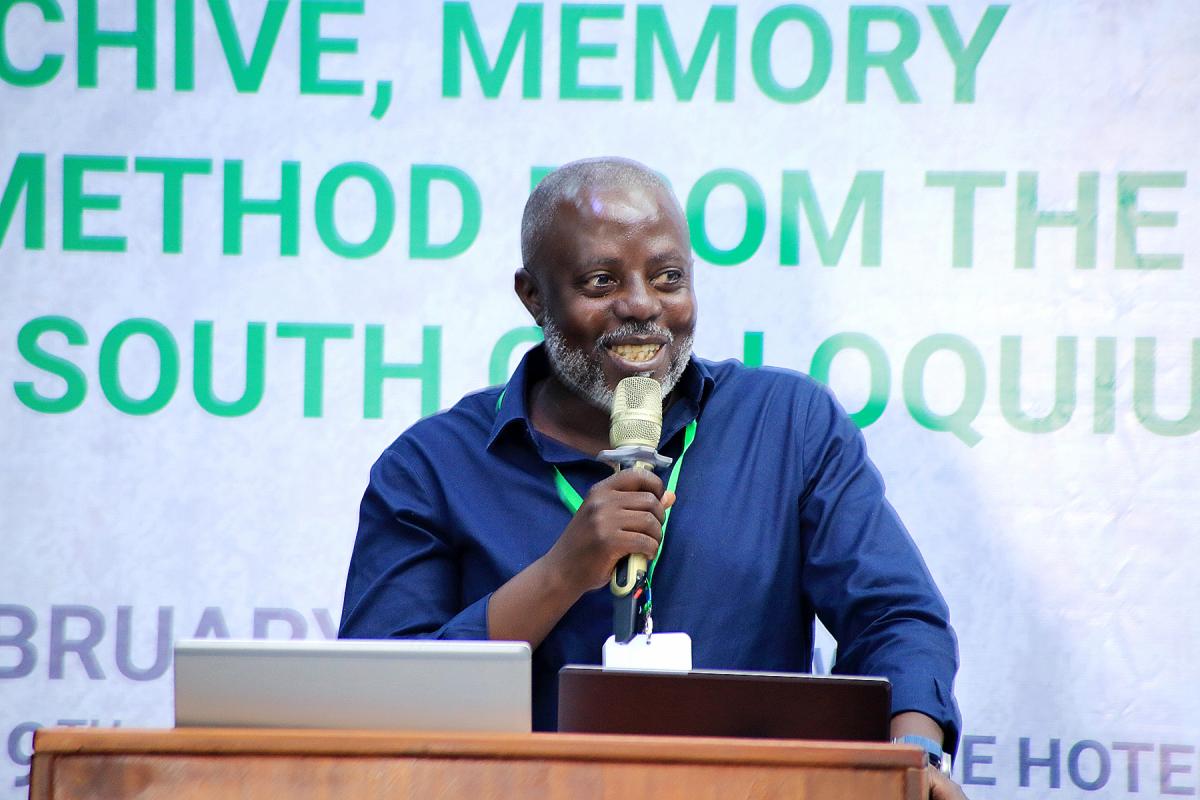
With the opportunity of teaching and funding from Mellon Foundation, the project team thought this was an interesting and important area to delve in.
“Our objective was to build capacity and indeed we have built capacity from the old retiring professors to the new generation that we have masters’ students and we hope to build on this to make this a substantial area of research in Makerere.
We were also to create a forum of engagement and we have maintained that forum in terms of reading groups, symposiums and now in a colloquium creating a community of regular engagement and discourse about this topic.
What will come out of the book and other deliverables would definitely generate pedagogies within the humanities disciplines to prepare students and faculty research in the area of archives”, Dr. Nabutanyi stated
The research team according to Nabutanyi has framed the book around three themes. One theme is Archive and Communities: Memories, Representation and Time. This theme is basically interested in getting off the hidden track of archival research and getting into the communities and looking at material and immaterial archiving including oral traditions, music, dance and non-material heritage rather than looking at archive as a state building where documents are kept.
The second theme: - Archives and Institutions: Power, Justice and Labor examine the status of institutional archives in Uganda including but not limited to those of the state. This theme assesses how these institutional archives are situated within national, regional and global power relationships.
The third theme: - Archive and Academia: Knowledge from the Global South creates the linkage between Archives and academic public discourse. The theme looks at the constrictive relationship between archives and humanities in Uganda over and above the dynamics reflects of the status in the Global South.
“With this project, we gave ourselves a task of inaugurating discussions and debates around archiving in its various forms. And some the tangible outputs would be the book that we are curating in this colloquium. It will be two special issues of Journals of Mawazo and the Journal of Languages, Literature and Communication.
Those products will be our gift to humanities research generally but humanities research in Archiving, Memory and Method from the Global South. But the most intangible and long-lasting outcome will be the community that we will have created in terms of the reading groups, symposiums in terms of the colloquium and the international conference to be held in November 2024.”, The convener reported.
The keynote Address
In her Key note address titled, “Keeping up with the community: Decolonial cues for archival praxis in the global south” Dr. Edwina De Ashie-Nikoi from the university of Ghana at Legon stressed how important it is for African Archivists, scholars and researchers to recognize archives as sites for power, memory and struggles.
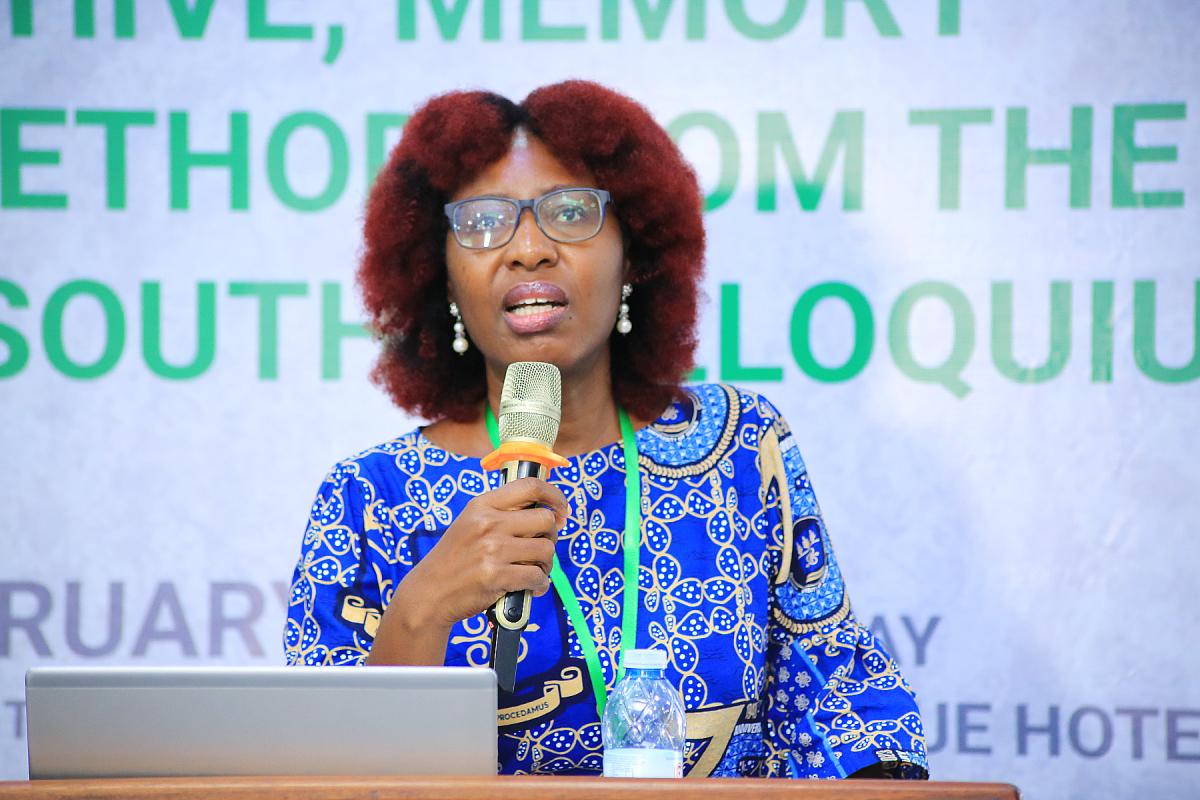
“In Ghana, Archival practioners and those who train them still think of archives as neutral spaces which are helpful for keeping governments accountable and on the other hand here in Uganda and other places in Africa, archives are literary spaces of power and struggle”. Dr. Edwina stressed
Referring to archival scholars, Dr. Edwina recognized the laudable efforts of African institutes to reclaim archival heritage. That notwithstanding, she emphasized that, it is time for disclosure on this archives so that African archives may be transformed to be more reflective of the African voices.
“I see this colloquium as leading us to grapple with what Africa’s archival future could or look like”, she urged.
As an engagement in the neocolonial project Dr. Edwina traced how Africa and African descendant communities have from the very start of the colonial project been resisting documentary eraser and silencing, looking at ways in which they adapted which can be instructive to the current concerns of decolonial archival practices.
Such a tracing, she said brings questions of interest to historians, archivists and other scholars and methods.
Edwina pointed out that approximately 12 million staff was stolen from the continent 400 years of the fragmented slave trade of rich traditions and knowledge ways. The violently dehumanizing chartered slavery of these documentaries she said, remain vital for these communities.
Despite banning and other cultural practices, Edwina noted that their memories survived and this ensured that their perspectives and experiences passed on African generations became an archive of the enslaved experience.
Dr. Edwina observed that although the enslaved appeared in the archival records of the colonizers, their voices were not recorded. Drawing on archival work in Ghana and Kenya Edwina implored African scholars, historians and archivists enhance research and document the African rich history and artifacts.
These and more details in the presentation attached.
Papers presented for the book chapters
A number of papers being prepared for the book chapters were reviewed during the colloquium.
- “We came as Colonizers”: Baganda Settlers’ claim over Mbale County 1939-1941 by Dr. Pamela Khanakwa
- Marriage and the making of Masculinities in Ankole and Bugisu Uganda by Dr. Amon Mwiine and Elizabeth Atuheire
- Archiving the traditional Obsterics Systems as part of contemporary and alternative medicine in Tooro region by Dr. Charlotte Mafumbo
- Motherhood in the Imbalu (Male) circumcision ritual among the bagisu in Uganda by Prof. Josephine Ahikire
- Remembering CoVID-19: How digital media contribute to archiving information about pandemics in Uganda by Dr. Sarah Namusoga-Kaale
- Ugandan columnist and the scrutiny of the Ugandan political class in the interregnum by Dr. Edgar Nabutanyi
- Community-based language archiving: The case of vocabularies and wall drawings of Igongo cultural meseum in South western Uganda by Dr. Celestino Orikiriza
- Did you say an oral archive? Challenges related to performativity in folktale representations of green life by Dr. Eve Nabulya.
- The politics of Community museums in identity construction. An analysis of selected Ugandan cases by Dr. Jimmy Spire Ssentongo
- Righting historical wrongs? The primacy of politics in Archiving indigenous knowledge in Bunyoro Kitara by Dr. Julius Kiiza
- Archiving the traditional obstetrics systems as part of complementary and alternative medicine in Toro region by Dr. Charlotte Mafumbo
- From Collective to individual memories: An exploration of preserving and transmitting Banyankole folklore by Dr. Levis Mugumya
Graduate students on the project showcased what they were doing for review. They include:
- Rwomushana Emmy: Exploring how negation constructs Gendered identities in the Runayankore-Rukiga Marriage songs.
- Gimono Esther: Examining the challenges of deaf women and deaf adolescent girls in accessing contraceptives services and information in Uganda.
- Ssendaula Jessy: Cultural memory and the archive in selected Kadongo kamu narrative songs of Herman Basudde Ssemakula
- Ssebuyungo Christopher: Historicising the idea and concept of museums in Uganda. The case of Uganda National Museum since 1901
- Nakamyuka Norah Winnie: The implications of Idi Amini’s Economic war in Uganda 1972-1982 A case study of Busoga sub region.
- Twinomugisha Brandon: Diachronic morphonological adaptations of English loan words in Runyankore - Rukiga
The colloquium was closed by the Deputy Principal CHUSS Assoc. Professor Eric Awich . Awich thanked participants for the productive two days.
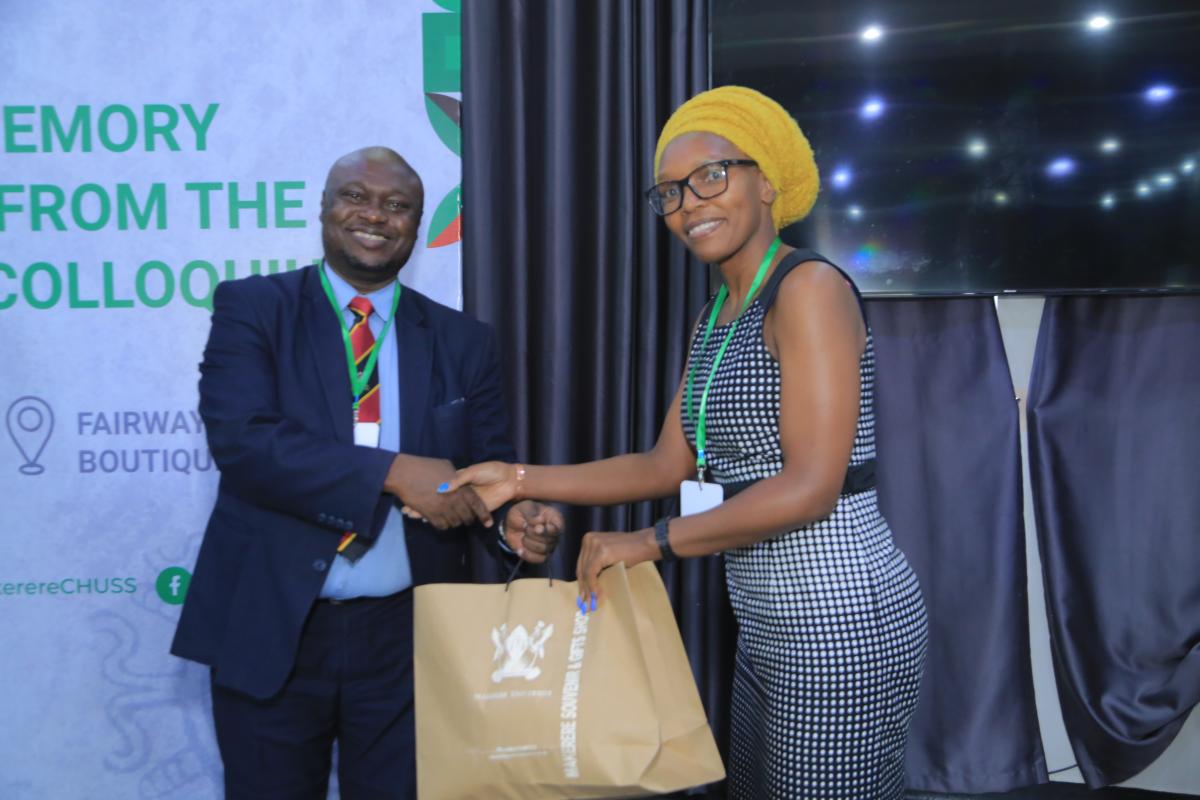
He appreciated the leadership of the project and the resourceful facilitators for providing input for the scholarly works
“A colloquium presents a very good opportunity for scholars to refine their work and original research idea in preparation for publication. For us in Makerere, that publication counts and you can be recognized”, He said
In addition to recognition, Prof. Awich urged staff to continue publishing to contribute to the body of knowledge and improving livelihoods.
The Deputy Principal appreciated the College leadership, coordinators and supervisors for providing a conducive environment for research to thrive.
He expressed optimism that with this kind of meeting, the college’s profile in terms of publication will significantly increase.
